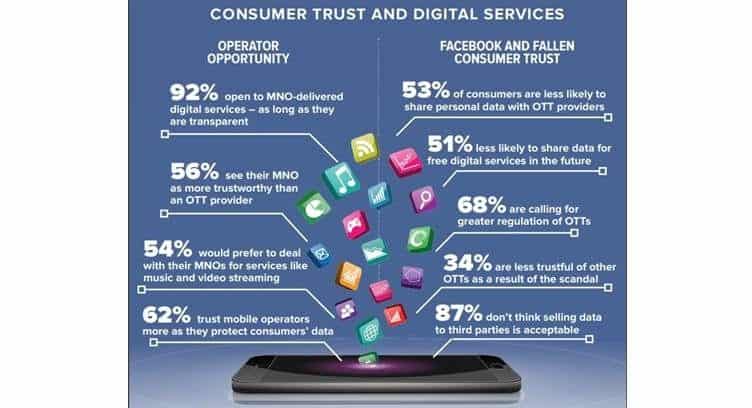The Facebook data scandal has not only eroded consumer trust in social media platforms, but also in digital services companies such as Netflix, Spotify and Skype. More than 50 percent of consumers are now less likely to share personal data with digital services companies, with 66 percent of consumers stating that they would prefer to pay for services if it meant more control. This is putting ‘freemium’ business models at risk, and opening new opportunities for alternative digital players including mobile operators.
A new study from Openet, released today, surveyed 1,500 consumers across the UK, US, Brazil and The Philippines on their perceptions of digital services companies and mobile operators following the recent data scandal. The survey highlighted several further consequences for digital service companies around consumer confidence in sharing personal data:
Trust eroded - 76% of consumers surveyed plan to increase digital account privacy settings, with potentially millions globally deleting an account because of the scandal. Calling for improved privacy processes - 87% of consumers surveyed do not think selling data to third parties is an acceptable business practice, 86% want more transparency around data use practices. Operator opportunity - 56% of consumers surveyed now see their operator as more trustworthy than a digital services company.
Niall Norton, CEO, Openet, said: “Until now, digital service companies like Netflix or Uber have been held up as the poster children for delivering personalised digital experiences and services. But it seems some have been a little too liberal in their use of consumer data, ruining the party for everyone. Since the Facebook data scandal, consumer attitudes towards digital service companies and personal data have eroded, with some consumers even deleting accounts in protest. In fact, many have expressed an interest in paying for services if it means that their data won’t be abused, signifying an end to the ‘freemium’ era. Consumers are clearly screaming out for something different, something trustworthy.”
Despite diminished trust among digital natives, mobile operators have not been subject to the same fate. Over half of the consumers surveyed now trust their operators more than digital service companies, citing the historical protection of their data as the key reason for this. In fact, an overwhelming number of consumers (92 percent) said that they’d be open to using mobile operator-delivered digital services as long as they are transparent about data processes.
Niall continued, “Mobile operators have traditionally had a much more conservative approach in their use of subscriber data, despite having an abundance of it. For a long time, this conservative approach to data use has been used as an unfavourable measure for operators’ digital efforts, especially in comparison to other digital-first companies. But times are changing and it’s clear that consumers expect more if they are to hand over personal data in exchange for services. Mobile operators have earned the right to answer this call. But to be successful, they must learn from the mistakes made by social media and digital service companies alike. Transparency around data collection and opt-in processes are now top priorities for consumers. Operators must bear this in mind when seizing new digital opportunities.”




















